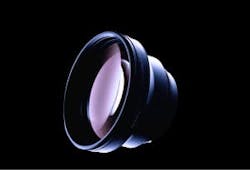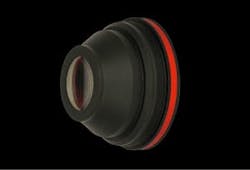F-theta lenses are the optics of choice for laser scanning, engraving, and cutting systems. At Avantier we produce high-performing custom F-theta lenses for a wide range of clients.
An f-theta lens (also known as a plane field objective or scan lens) is not just one optical piece; it is an assembly containing three or four lenses pre-aligned and mounted within sturdy housing for easy use. While an ordinary lens can be used to focus a laser beam on a spherical surface, using a F-theta lens allows you to work with a plane focusing surface. It also features a spot size that is almost constant over the scan field, and a laser spot position proportional to the scan angle. This makes it incredibly useful for use with lasers.
Applications of F-Theta Lenses
F-theta lenses are a key part of many laser scanner systems, especially those in which high resolution and a flat imaging field are needed. In materials processing drilling, welding, and cutting of synthetic materials with laser often relies on F-theta lenses, as do engraving and labeling systems and image transfer.
In biotechnics, these lenses play a part in ophthalmology and confocal microscopy.
Why Choose F-Theta Lenses For Scanning Applications
Scan mirrors or a galvanometer are typically used to move a laser beam linearly in a scanning system. This enables the laser to be guided for drilling, cutting, or engraving. If an ordinary lens were used to focus the laser, the curved lens surface would lead to changes in the beam profile as the distance from the optical axis changes. These changes in the beam profile could lead to inconsistency in optical power and result in manufacturing defects.
A traditional flat-field scanning lens solves this problem to some extent by focusing light on a flat plane. However, they introduce other aberrations and errors because the image produced does not move linearly as the angle changes.
F-theta lenses eliminate both types of manufacturing errors and enable consistent, reliable laser-powered materials processing.

